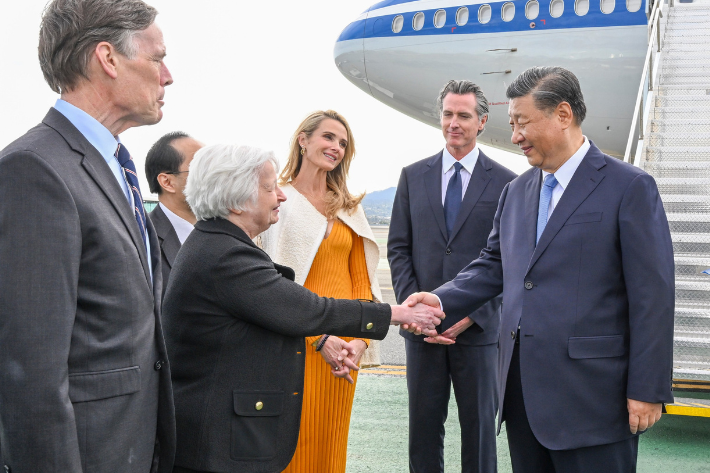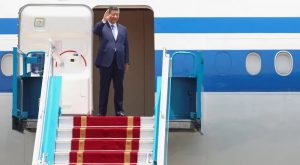Chinese President Xi Jinping will meet top leaders from US businesses in San Francisco on Wednesday, in a bid to woo American investment to a slowing and bumpy economy.
“The purpose of the dinner is to foster better communication,” one source close to the organisers said, declining to say who would speak while confirming representatives from both the Chinese and US governments would share the podium.
The pricey dinner, with ticket prices as high as $40,000 for a table of eight, will be held on the margins of the Asia-Pacific Economic Cooperation (APEC) forum and a closely watched summit between Xi and US President Joe Biden.
Also on AF: Biden, Xi Will Vow to Ban AI in Nuclear Weapons, Drones
The two leaders are expected to hold talks through the day, after meeting for the first time in a year on Wednesday.
The business dinner, while yet to be formally announced by hosts US-China Business Council (USCBC) and the National Committee on US-China Relations (NCUSCR), could also present uneasy optics for China’s Xi.
US lawmakers have consistently criticised some American businesses for turning a blind eye to allegations of forced labour in China and some have been scathing in their criticism of the event.
“How does that dinner conversation go? ‘Wow, this filet mignon is a little dry. How’s your extrajudicial internment of over a million Uyghur Muslims going?” said Mike Gallagher, the Republican chair of the House of Representative’s select committee on China.
The US has, on its part, attempted to clamp down on major Chinese exports — ranging from solar panels to cotton — that it suspects has links to the alleged use of forced labour in China’s Xinjiang region. The Biden Administration is also reportedly looking at its electric vehicle supply chains for any links to ‘forced labour’.
China, meanwhile, has rejected all allegations around the use of forced labour in Xinjiang.
WATCH: Chinese supporters waving Chinese flags greet Chinese President Xi in San Francisco, California pic.twitter.com/vUhFe3PSrG
— Insider Paper (@TheInsiderPaper) November 15, 2023
Business leaders pessimistic
The APEC summit is set to see the participation of top finance and tech leaders, including Tesla’s Elon Musk, OpenAI’s Sam Altman, Google’s Sundar Pichai, Microsoft’s Satya Nadella and Citi CEO Jane Fraser.
But for American businesses, Wednesday’s dinner will particularly be a chance to hear directly from the leader of the world’s second-biggest economy as they search for ways to navigate China’s economic slowdown.
A US push to “de-risk” some American supply chains away from China and uncertainty caused by expanding Chinese security rules has also weighed in business sentiment.
Jeff Moon, a former US trade official turned business adviser, said China’s goal would be to soften Xi’s image and attract investment, but that the dinner was unlikely to “move any needles.”
Executives of some companies who spoke privately to Reuters also said they would steer clear of the dinner given questions about the utility for their operations in China and US political risks.
Xi’s ‘reassurance tour’
For decades, business and trade has been at the centre of US-China relations, helping to fuel China’s explosive economic resurgence.
But concerns about a new-style Cold War between the rival economic and geopolitical superpowers has increasingly placed companies in the cross hairs of both governments.
The US is attempting to hobble China’s progress in advanced technologies — from semiconductors and artificial intelligence to quantum computing. China, too, has returned fire with retaliatory moves such as targeting outflows of critical minerals and imposing fines and conducting raids on US businesses operating in the country.
The moves have meant that the business optimism among US companies in China has sunk to a record low this year.
Also on AF: China Says Doors Will Open Wider, After Raimondo’s ‘Uninvestible’ Bombshell
Indeed, a report by the US-China Economic and Security Review Commission this week said: “China may now be on the verge of its most serious economic crisis in 40 years.
“This poor performance has raised new doubts about General Secretary of the CCP Xi Jinping’s economic management skills as well as China’s model for sustaining long-term growth.
“The CCP is reluctant to relax its grip on the economy by placing greater reliance on market forces and putting more money and decision-making power in the hands of consumers and private entrepreneurs,” it said.
Amid such a business atmosphere, the dinner is Xi’s “reassurance tour,” Nirav Patel, chief executive of consultancy The Asia Group said.
Business leaders would look to Xi to set expectations for how foreign companies would be treated in China, he added.
“They have come to accept that there’s no substitute for hearing and seeing and observing what Xi Jinping is doing,” Patel said. “Of course, there are some that want to be able to demonstrate that they are committed to China and their presence in these meetings demonstrates that.”
View this post on Instagram
Lots on Xi-Biden agenda
Xi is on his first visit to the US in more than six years and is widely expected to deliver a speech.
Chinese leaders have been eager to convince the world that China is still open for business after recording its first-ever quarterly deficit in foreign direct investment.
America’s Biden, meanwhile, has sought direct diplomacy with Xi, betting that a personal relationship he has cultivated for a dozen years with the most powerful Chinese leader since Mao Zedong might salvage bilateral ties that are increasingly turning hostile.
As Xi and Biden meet, the two leaders are expected to hold talks on artificial intelligence, military conflicts and drug-trafficking.
Officials on both sides of the Pacific have set expectations low as Biden and Xi are set to discuss Taiwan, the South China Sea, the Israel-Hamas war, Russia’s invasion of Ukraine, North Korea, and human rights — areas where the leaders have been unable to resolve long disagreements.
The two leaders are expected to meet far from the conference location at a vast estate miles outside of San Francisco carefully chosen for its security, serenity and remoteness.
“The table has been set … over the course of many weeks for what we hope will be a very productive, candid, constructive conversation,” John Kirby, a White House spokesperson said.
- Reuters, with additional inputs from Vishakha Saxena and Jim Pollard
Also read:
Biden Keen to Resume Military Ties With China to Avoid Flare-ups
Xi Says China Willing to Cooperate as Key Aide Visits US
China Tensions Leave US Firms Between a Rock and a Hard Place
Report Explains How China Got Round US’s Initial Chip Curbs
China Plans New Checks For Auditors, Accounting Firms
Kishida-Xi Talks May Touch on Arrests Killing Bilateral Business
China’s New Anti-Espionage Law Puts Firms at Risk, US Warns
China Asks Deloitte to ‘Learn Lesson’ From $31m Audit Fine – FT
US And China Set to Hold Nuclear Arms Control Talks – WSJ
























